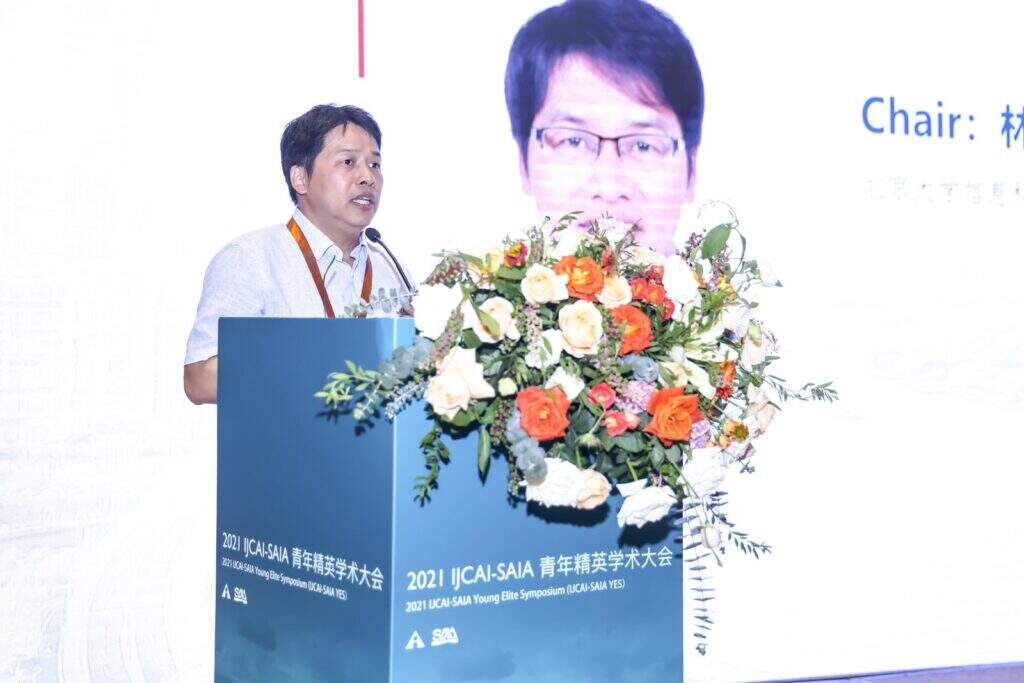Command Palette
Search for a command to run...
Cross-disciplinary Professor Lin Zhouchen: Coming From Peking University and Returning to Peking University

Contents:IJCAI-SAIA YES was held in Shanghai from July 5 to 7. At this event that brought together young scholars and academic giants in the field of AI, we had the honor of interviewing Professor Lin Zhouchen from the School of Information Science and Technology of Peking University.
Original:HyperAI
Keywords:Peking University CV IJCAI-SAIA YES
In October 2020, Stanford University in the United States and Mendeley Data released a list of the world's top 2% scientists.
The list is based on the literature database Scopus, and is based on comprehensive indicators such as the number of citations, H factor, HM factor, etc., from the two dimensions of "career influence" and "annual influence".The world's top 2% scientists were selected from nearly 7 million scientists from 22 fields and 176 sub-fields.

Professor Lin Zhouchen from the School of Information Science and Technology of Peking University, with excellent comprehensive results,Successfully selected into the 2020 world's top 2% scientists' "Career Impact" list and "Annual Impact" list.

We had the honor to interview Professor Lin Zhouchen at this year's IJCAI-SAIA YES.
11 years of studying and pursuing the dream of mathematics
In 1989, Lin Zhouchen, from Yongtai County, Fuzhou City, Fujian Province, was admitted to the Department of Mathematics of Nankai University due to his excellent performance in high school mathematics competitions, thus starting his journey to study in the north.During the period of Southwest Associated University, Nankai University cultivated the greatest Chinese mathematics master of the 20th century and the father of modern differential geometry – Shiing-Shen Chern. The mathematics pilot class that Lin Zhouchen studied in was founded by Shiing-Shen Chern after he returned to China.

The rich teaching atmosphere and strong scientific research strength of Nankai University's Department of Mathematics provided a fertile and free soil for Lin Zhouchen's development. In his junior year, the Department of Mathematics where Lin Zhouchen worked opened a computer course.On a 286 computer, he first came into contact with simple programming.
In 1993,Mr. Lin Zhouchen, who regards becoming a mathematician as his life ideal,At Nankai, I fully experienced the abstraction and beauty of pure mathematics and spent four fulfilling years at university.
In July of the same year, Mr. Lin Zhouchen graduated from Nankai University and was admitted to the Department of Mathematics of Peking University with the second highest score in his major to continue his master's studies.
At Peking University, Professor Lin Zhouchen began to get involved in AI.I have initially learned image processing and pattern recognition.He also participated in several practical projects, one of which was to build a geographic information system to digitize and manage hand-drawn or printed maps. Through these courses and projects, Mr. Lin Zhouchen experienced the charm of AI.
In 1995, after graduating from Peking University with a master's degree in mathematics, Lin Zhouchen went to Hong Kong.I then completed two years of master's studies at the Department of Applied Mathematics at the Hong Kong Polytechnic University and mastered the basics of computational mathematics.

After completing my studies at the Hong Kong Polytechnic University,In 1997, Professor Lin Zhouchen returned to Peking University's Department of Mathematics (which had been upgraded to a college at that time) to pursue a doctorate.At that time, the School of Mathematics at Peking University paid more attention to applications. Under the leadership of Academician Cheng Minde,The School of Mathematics at Peking University began researching artificial intelligence very early on and has trained famous artificial intelligence experts such as Academician Shi Qingyun.
After Lin Zhouchen returned to the School of Mathematics at Peking University,I have studied courses on image processing, machine vision and pattern recognition in depth.Teacher Lin Zhouchen, who aspires to become a mathematician, began to turn to the field of AI.
After 12 years, MSRA finally moved from industry to academia
During his doctoral studies, Lin Zhouchen was invited by chance by Dr. Harry Shum, Director of the Visual Computing Group at Microsoft Research China (later upgraded to Microsoft Research Asia).I came to Microsoft Research China for an internship, studied the problem of light field sampling, and made important theoretical breakthroughs.
This experience became an important turning point in teacher Lin Zhouchen's career development.
In July 2000, after graduating with a Ph.D., Lin Zhouchen successfully stayed in the Visual Computing Group of Microsoft Research China.He continued to engage in related research in the fields of image processing, pattern recognition, computer vision, etc. for 12 years.

During these 12 years, he rose from associate researcher to senior researcher.He has published more than 60 high-quality academic papers, presided over a number of R&D projects within Microsoft, and developed a number of technologies that have been integrated into Microsoft's major products Windows Vista Tablet PC Edition and Office OneNote 2003.
Compared with commercial companies that focus on product applications, Lin Zhouchen, who was deeply influenced by basic mathematics during his undergraduate studies, prefers to explore principles. He gradually realized:Doing scientific research without commercial goals may be more suitable for me.
In 2012, 40-year-old Lin Zhouchen ended his 12-year work experience at Microsoft Research Asia.Returned to teach at the Department of Intelligent Science, School of Information Science and Technology, Peking University.
Enrollment is based on "four good" qualities, theory is better than programming
After returning to Peking University, Professor Lin Zhouchen became a professor in the Department of Intelligent Science, mainly researching machine learning and computer vision.
He named his research group ZERO Lab, which is the abbreviation of Zlin's Extraordinary Research Oasis.It also represents the four qualities that laboratory members should have: Zeal, Excellence, Reliability and Openness.

Influenced by Dr. Shen Xiangyang, when selecting students, Professor Lin ZhouchenThere is a set of "four good" standards: good in math, good in programming, good in English, and good in attitude.
When it is impossible to have all four qualities, then at least two qualities must be met, among which a good attitude is the basic requirement, good math is a personal inclination, followed by good programming, and finally good English.
As a scholar who loves theoretical research, Professor Lin Zhouchen has always followed the research philosophy of Vapnik, a leader in machine learning, that "Nothing is more practical than a good theory". Therefore, when selecting students,Compared with theoretical ability and programming ability, he pays more attention to the former.

During the student inspection phase,Teacher Lin Zhouchen also maintains an open and responsible attitude.He assigns students thinking questions in advance, allows students to contact multiple tutors at the same time, and withdraw at any time during the examination stage. For some students who are not selected, he will enthusiastically recommend them to other tutors.
In the opinion of Mr. Lin Zhouchen,Studying for a doctorate is a two-way selection process between the tutor and the student.Only when they match each other can students learn happily and tutors teach smoothly.
A good doctoral supervisor should be both a teacher and a friend
Many doctoral students will bring their undergraduate study habits into their doctoral studies, and they are extremely dependent on their supervisors and expect idealized and definite results. In fact, in the application field, the purpose of scientific research is to find new solutions. The supervisor is not omniscient and omnipotent, and he often does not have a definite answer.
Therefore, in the opinion of Professor Lin Zhouchen, choosing to pursue a doctorate requires great initiative and preparation to face the unknown.
Teacher Lin Zhouchen believes thatThe relationship between mentors and students should be that of both teachers and friends.In addition to guiding students in academic research and teaching them in accordance with their aptitude, we must also maintain communication with students, pay attention to and understand their mental state,Right nowThe tutor should give students guidance in their studies and give them spiritual care.
Professor Lin Zhouchen also strongly encourages young scholars to participate in activities like IJCAI-SAIA YES.This is a gathering of young people, which will help increase everyone's participation and enthusiasm in large-scale international conferences and enhance the confidence of domestic scholars at international conferences.

Regarding the selection of research questions, Professor Lin Zhouchen also gave his own suggestions:Fully understand the research direction and choose the most important, core and "bottleneck" problem that is suitable for you.Only research conducted in this way will be of great significance and have the potential to gain more attention and citations.
As for the same topic, Professor Lin Zhouchen thinks that this is normal. As long as the chosen problem is an important problem in the field, you can do it with confidence. The quality of the final paper will definitely not be bad, and the solution will also be different from others.
Life is a process of constant choice and giving up
During his 11 years of study, Professor Lin Zhouchen started from basic mathematics and applied mathematics research, and then embarked on the scientific research path of artificial intelligence.
After 12 years at Microsoft Research Asia, 40-year-old Professor Lin Zhouchen made a major career change: he gave up the generous treatment at Microsoft Research Asia and returned to Peking University to teach and continue his research in artificial intelligence theory.
There is an old saying that goes "At forty, one is free from doubts", which means that one has a clear judgment of oneself and can make the choice that suits him best.Teacher Lin Zhouchen made a choice and gave up at the age of 40. He no longer had any doubts or confusions, but only a firm determination to move forward.

